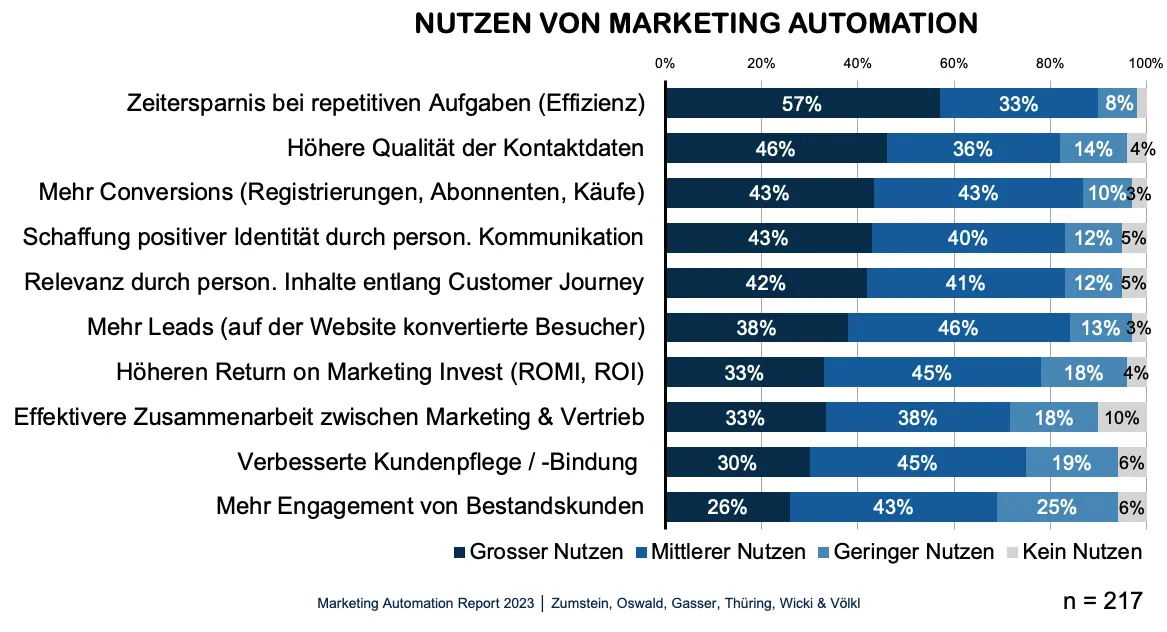Marketing Automation Becoming Increasingly Important for Businesses
Whether sharing content on social media, sending e-mails to customers, or handling lead generation, the use of automated processes in marketing is becoming increasingly important for Swiss companies. This is according to the latest Marketing Automation Study by ZHAW. Companies also rated their maturity in this area as better than a year ago. Thanks to the recently developed Marketing Automation Maturity Index (MAMI), self-assessments like these can now be validated and compared across companies.
This third Marketing Automation Study was conducted on behalf of Pedalix by the E-Commerce Lab at the ZHAW Institute of Marketing Management. A total of 226 companies were consulted, and the findings confirm that marketing and sales automation is gaining practical significance. Seventy-five percent of the companies surveyed – most of them in the business-to-business sector – consider marketing automation relevant. This puts it fourth among the most significant marketing technologies, just behind customer relationship management (CRM), e-mail or newsletter marketing, and search engine marketing.

More and better leads thanks to automation
Automation greatly benefits companies, especially in terms of time saved on repetitive tasks and the efficiency of marketing and sales processes. “Thanks to marketing automation, more leads of higher quality can be generated,” explains Dr. Darius Zumstein, who oversaw the study as Head of the E-Commerce Lab at the ZHAW School of Management and Law. “Marketing automation also leads to more conversions, meaning more registrations, subscriptions, and transactions.” In addition, thanks to personalized communication along the customer journey, the relevance of the information for existing or potential customers can also be increased and a positive identity created.
However, the introduction of automated processes in marketing also presents companies with challenges, especially a lack of resources for content marketing and lead generation. Small and medium-sized enterprises (SMEs), in particular, lack the budget for automation. Lack of information about which contacts are ready to buy and undefined processes for systematically nurturing leads and existing customers are also challenges for many businesses.
Applications for social media and e-mail marketing
When asked about specific use cases for marketing automation, automated content distribution via social media was the most frequently mentioned, followed by welcome e-mail sequences for new customers. Using marketing automation tools for lead generation and nurturing, such as e-mail campaigns with recommendations for “non-sales” content, benefits the majority. Communication processes are automated just as frequently for opt-ins, registrations, and customer profiles as for administrative procedures, such as making appointments, support requests, or satisfaction surveys.
Overall, the companies rated their maturity level in the context of marketing automation as better than a year ago. However, companies with lower maturity levels complained about a lack of resources, know-how, or understanding from key people in their companies. In contrast, those with high maturity levels benefited from a clear strategic focus and sufficient time resources.
New maturity model developed
The study developed an automation maturity model – the Marketing Automation Maturity Index (MAMI) – to validate this self-assessment. As a result, cross-company and cross-industry comparisons are possible for the first time. The Index shows that large companies are more advanced than SMEs and that the finance, services or communications, IT, software, and SaaS (software as a service) sectors demonstrate the highest level of marketing automation maturity. Traditional industries such as manufacturing and construction have lower levels of automation.
“The maturity of marketing automation will continue to increase in the future, as most companies are keen to expand automation and digitization,” says Zumstein. Most businesses have too few applications to implement marketing automation successfully, but “the potential for implementing use cases is still huge.”
Research partners Pedalix (Marc Gasser), Mayoris (Urs Thüring), webalyse (Klaus Völkl), atedo (Alexander Wiki), and Survalyzer (Christian Hyka) all participated in the Marketing Automation Report.
Contact
Dr. Darius Zumstein, Institute of Marketing Management, ZHAW School of Management and Law
Phone +41 (0)58 934 66 08, e-mail darius.zumstein@zhaw.ch
Christian Busenhart, Communications, ZHAW School of Management and Law
Phone +41 (0)58 934 77 41, e-mail christian.busenhart@zhaw.ch